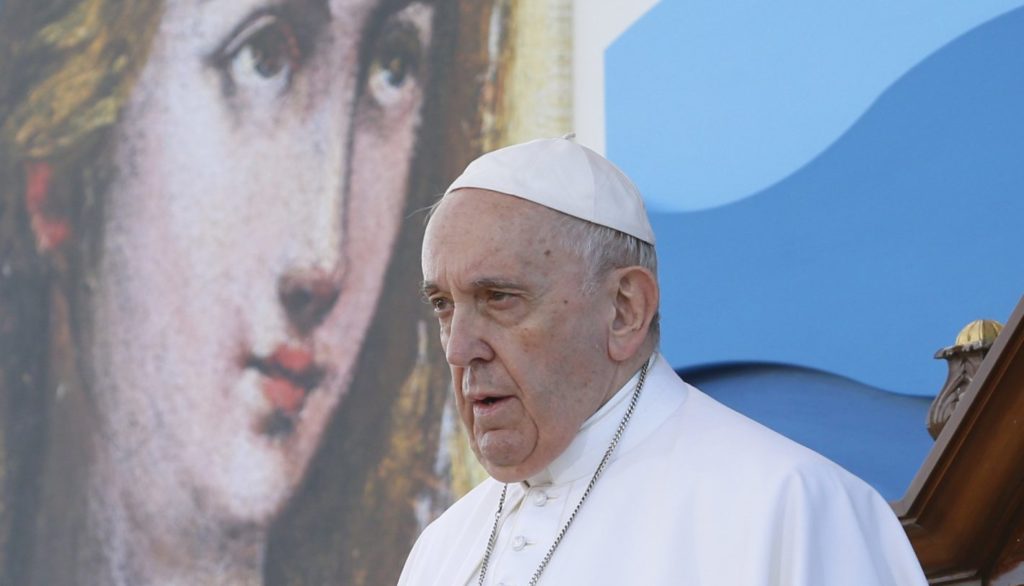Yesterday afternoon, the first day of the Pope's apostolic journey to Malta, an emotional prayer meeting took place with thousands of people at the Marian shrine of Ta' Pinu, on the island of Gozo, a place of great piety for the Maltese, visited by St. John Paul II and later by Benedict XVI. The Holy Father recalled this when he commented: "Here also St. John Paul II came as a pilgrim, and today we remember the anniversary of his death".
Following in the footsteps of his predecessors, Francis visited the shrine chapel and prayed the three Hail Marys before the image of the Virgin, presenting her with a golden rose as a gift, a gift from the Popes to express reverence for the Mother of God, Vatican news reported.
After listening to the testimony of faith of several people, the Pope gave his homily based on the passage from the Gospel according to St. Matthew that recounts the moment when the Virgin Mary and the disciple John accompany Jesus on the cross in the midst of a desolate panorama in which it seems that "everything has ended forever".
With Jesus on the cross
"The Mother who gave birth to the Son of God is grieving for his death, while darkness covers the world. The beloved disciple, who had left everything to follow him, now stands motionless at the feet of the crucified Master. It seems that all is lost," the Pope said, underlining the profound meaning of Jesus' words: "My God, my God, why have you forsaken me?
"This is also our prayer in the moments of life marked by suffering," the Holy Father said, recalling that it is the same prayer that "every day goes up to God" from the heart of humanity. The Pontiff emphasized that the hour of Jesus - which in the Gospel of St. John is the hour of death on the cross - does not represent the conclusion of history, but marks the beginning of a new life".
"Next to the cross, in fact, we contemplate the merciful love of Christ, who extends towards us his arms wide open and, through his death, opens us to the joy of eternal life." For this reason, the Pope invited the faithful to meditate together from the sanctuary of Ta' Pinu on "the new beginning that springs from the hour of Jesus", and that "each one can transfer to his own history, observing the personal moments of pain in which faith and hope have appeared, even though it seemed that all was lost".
"Back to the origins".
Francis thus encouraged us to try to understand the invitation that the hour of Jesus proposes to us: "That hour of salvation for us tells us that to renew our faith and the mission of the community, we are called to return to that beginning, to the nascent Church that we see in Mary and John at the foot of the cross".
And what does it mean to go back to the beginning? What does it mean to go back to the origins? For the Holy Father, the essential of faith is the relationship with Jesus: "It is a matter of rediscovering the essential of faith", that is, "to return to the Church of the origins does not mean looking back to copy the ecclesial model of the first Christian community, but rather, to recover the spirit of the first Christian community, to return to the heart and rediscover the center of faith: the relationship with Jesus and the proclamation of his Gospel to the whole world".
"The personal encounter with Christ".
The Pope then pointed out that "the life of the Church is not only a past history to be remembered", but "a great future to be built", being "docile to God's plans".
"A faith made up of handed-down customs, solemn celebrations, beautiful popular gatherings and strong and exciting moments cannot suffice for us; we need a faith that is founded and renewed in a personal encounter with Christ, in daily listening to his Word, in active participation in the life of the Church, in the spirit of popular piety," the Holy Father added.
Francis is aware of "the crisis of faith, the apathy of believing practice, especially in the post-pandemic period, and the indifference of so many young people to the presence of God." "These are not issues that we should 'sugarcoat', thinking that after all a certain religious spirit is still holding out." "It is necessary to be vigilant so that religious practices are not reduced to the repetition of a repertoire of the past, but express a living faith, open, that spreads the joy of the Gospel".
In this regard, Pope Francis thanked the Maltese for the "process of renewal initiated, through the Synod". "This is the time to return to that beginning, at the foot of the cross, looking back to the first Christian community. To be a Church that cares about friendship with Jesus and the proclamation of his Gospel, not the search for space and attention; a Church that puts witness at the center, and not certain religious practices; a Church that wants to go to meet everyone with the lighted lamp of the Gospel and not be a closed circle."
"Malta and Gozo: you are two beautiful communities, just as Mary and John were two. May the words of Jesus on the cross then be your pole star, to welcome one another, create familiarity and work in communion. Go forward, always together!" the Pope encouraged.









